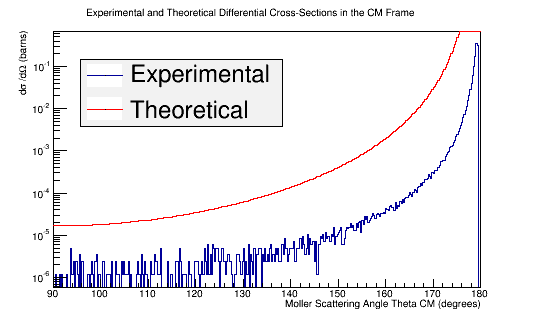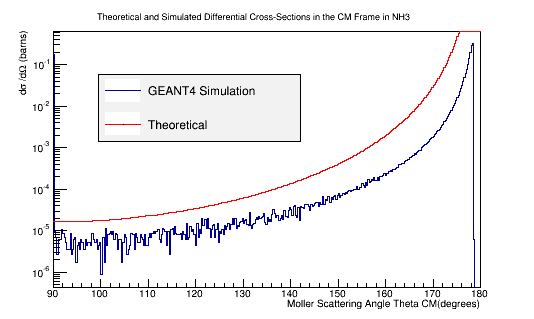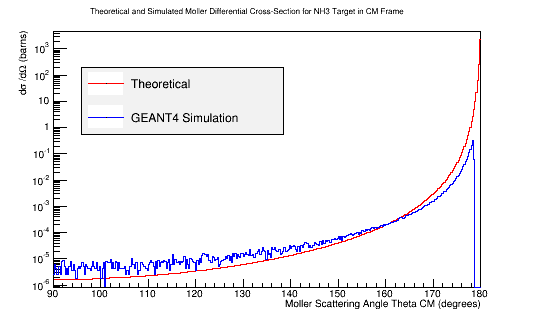Difference between revisions of "DV RunGroupC Moller"
Jump to navigation
Jump to search
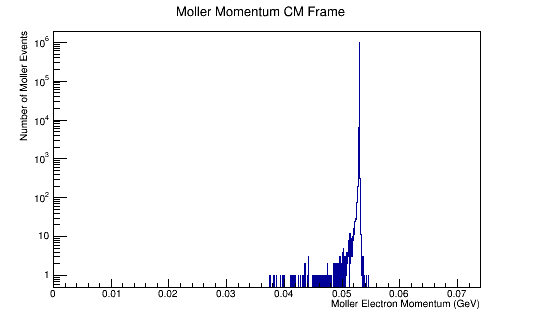
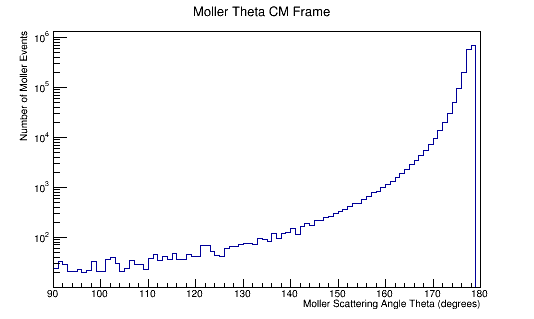
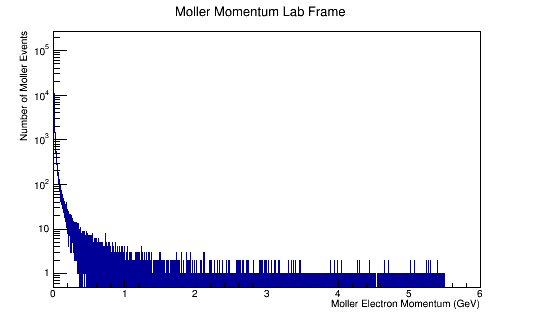
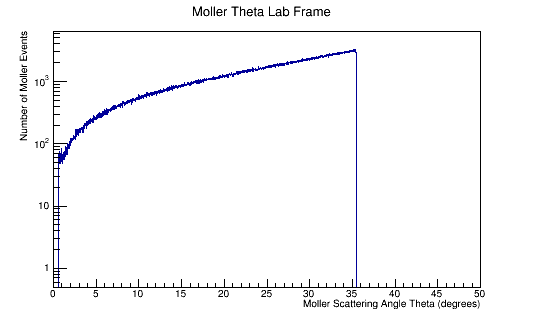
| Line 54: | Line 54: | ||
Run the above theta and E distribution of Mollers through GEMC with and without Solenoid on. Determine the Theta and E range of Mollers that enter the detector. | Run the above theta and E distribution of Mollers through GEMC with and without Solenoid on. Determine the Theta and E range of Mollers that enter the detector. | ||
| + | |||
| + | |||
| + | Scanning from 2MeV to 5500MeV, and 0 to 36 degrees in Theta. | ||
| + | |||
| + | For Solenoid on with 5T: | ||
<pre> | <pre> | ||
Revision as of 16:27, 21 April 2016
need to insert moller shielding into card after moller LUND file is created. (see clas12/beamline)
Simulating the Moller scattering background for EG12
Moller Differential Cross-Section
GEANT4 Simulation of Moller Events
Simulation Setup
Use GEANT4 via GEMC to estimate the Moller background for electron scattering experiments in JLab's Hall B. The first step towards this goal is to use GEANT4 without the GEMC infrastructure to create event (LUND) files that will be used as input events for GEMC.
Benchmark GEANT4's Moller scattering prediction with the theoretical cross section using LH2
Comparison of simulation vs. the theoretical Møller differential cross section using 11 GeV electrons impinging LH2
Change to a NH3 Target
Replacing the LH2 target with an NH3 target
Benchmark GEANT4's Moller scattering prediction with the theoretical cross section using NH3
Comparison of simulation vs. the theoretical Møller differential cross section using 11 GeV electrons impinging NH3
LH2 Vs. NH3
Benchmark GEANT4's Moller scattering prediction for NH3 and LH2
Effects Due to Target Material
Target Density
Atomic Mass and Electron Number Effects
Differential Cross-Section Offset
ROOT Macro to read LUND files and make plots




Run the above theta and E distribution of Mollers through GEMC with and without Solenoid on. Determine the Theta and E range of Mollers that enter the detector.
Scanning from 2MeV to 5500MeV, and 0 to 36 degrees in Theta.
For Solenoid on with 5T:
<gcard>
<detector name="../../../../../clas12/fc/forwardCarriage" factory="TEXT" variation="original"/>
<detector name="../../../../../clas12/dc/dc" factory="TEXT" variation="original"/>
<detector name="../../../../../clas12/ec/ec" factory="TEXT" variation="original"/>
<detector name="../../../../../clas12/ctof/ctof" factory="TEXT" variation="original"/>
<detector name="../../../../../clas12/ftof/ftof" factory="TEXT" variation="original"/>
<detector name="../../../../../clas12/htcc/htcc" factory="TEXT" variation="original"/>
<detector name="../../../../../clas12/pcal/pcal" factory="TEXT" variation="original"/>
<option name="BEAM_P" value="e-, 2.800*GeV, 18.0*deg, 10*deg"/>
<option name="SPREAD_P" value="2.798*GeV, 18*deg, 180*deg"/>
<option name="SCALE_FIELD" value="clas12-torus-big, -1.0"/>
<option name="HALL_FIELD" value="clas12-solenoid"/>
<option name="SCALE_FIELD" value="clas12-solenoid, 1.0"/>
<option name="OUTPUT" value="evio,eg12.ev"/>
</gcard>
Reconstruction of Moller Events
The LUND format
Writing LUND files
Running GEMC
Phi Shift observation using DC hit Reconstruction Data
Gcard creation defining energy and angle range of electrons
Modified gcards
Effects of Solenoid on Electrons
Results for defined distribution in Solenoid Fields
Results for Random Spread of Energy and angle theta in the Lab frame
Cover Full Solid Angle of Detector
Calculations of 4-momentum components
Alter Phi Angles
Check Differential Cross-Section
Running Expanded LUND files in GEMC
Papers used
[1]Farrukh Azfar's Derivation of Moller Scattering
A polarized target for the CLAS detector
An investigation of the spin structure of the proton in deep inelastic scattering of polarized muons on polarized protons
QED Radiative Corrections to Low-Energy Moller and Bhabha Scattering
http://arxiv.org/abs/1602.07609
